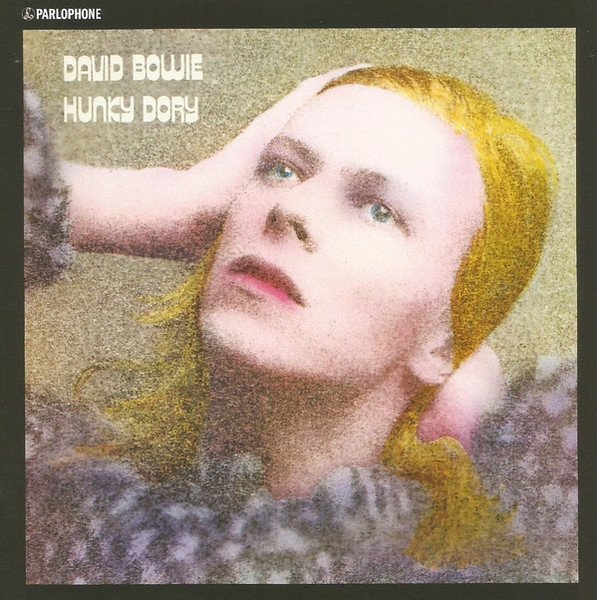When: Released December 17, 1971
Why? I’ve only heard a few of Bowie’s radio singles, never an album that helped establish his reputation. “Hunky Dory” is often cited as Bowie’s first great album, the one where he finally found his voice. A couple of musicians I respect—notably Dave Stewart and K.T. Tunstall—consider it highly influential on their work. Tunstall calls it her favorite album.
What? Eleven songs, 42 minutes. An esoteric collection of pop songs ranging from straightforward to art-pop and musical hall. Lyrically, it includes psychedelic stream-of-consciousness prose poems, a loving song for his new son, reflections on fame and maturation, and at least one song that seems to verge on parody.
First Impressions: The most surprising thing for me was how acoustic and piano-driven it is. With the exception of one or two songs, there is very little electric guitar. A synthesizer seems to only appear in the intro to one song; the dominant keyboard is piano, which is everywhere (and very well played by Bowie and Rick Wakeman).
Previously, I was only familiar with “Changes,” the big hit from this album. It was my favorite track. I also enjoyed “Oh! You Pretty Things,” “Life on Mars?,” and “Kooks.” I can definitely see myself adding all of those songs to a playlist.
Of the remaining seven tracks… I enjoyed hearing them—I ended up listening to the whole album twice—but they didn’t resonate with me. The melodies meandered. Lyrics ranged from understandable but unrelatable (for me) to obscure. The generally sparse arrangements seemed to work well in support of the songs, but I was often left wondering why anyone bothered. Is the cover song “Fill Your Heart” meant to be a parody? ironic? Is there a point to an “Eight Line Poem” about a cactus on a windowsill? Is the seemingly nonsensical “The Bewlay Brothers” really worth the effort of trying to parse out all of the hidden autobiographical hints and allusions critics have since begun to see in it?
Three “tribute” songs (for Andy Warhol, Bob Dylan, and Lou Reed) make up the bulk of the album’s second half. I’m not surprised Warhol reportedly didn’t care for his song; there just isn’t much to it—and what is there doesn’t seem flattering. I thought Dylan fared better in terms of the songwriting. Bowie’s song for Reed, “Queen Bitch,” is as close as the album comes to a rocker. But, again, it’s not the most flattering portrait.
So? Maybe Bowie just isn’t my taste beyond a few popular singles. Maybe this is one of those albums that you can only really appreciate if you were there when it was released. Or maybe it’s best appreciated by those who knew Bowie’s work before “Hunky Dory” and can better understand what its songs represented for him and his career.
I’m glad to have heard this. I discovered a couple of tracks I will enjoy listening to again. But it isn’t an album I’d go out of my way to revisit in its entirety.
